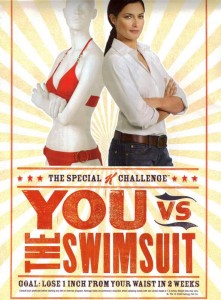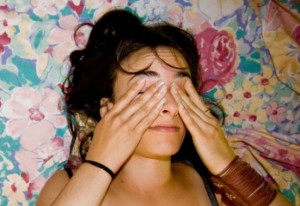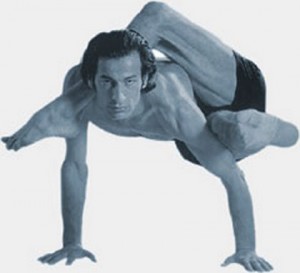June 18th, 2012 by Dr. Val Jones in Health Tips, Humor
No Comments »
 Are you one of those people who’s been singled out for constant attack by mosquitoes? Ever felt like the designated bug decoy at a party? It does seem that those pesky biting insects have a preference for certain individuals, so the real question is: why you?
Are you one of those people who’s been singled out for constant attack by mosquitoes? Ever felt like the designated bug decoy at a party? It does seem that those pesky biting insects have a preference for certain individuals, so the real question is: why you?
I wish there were a simple answer, but scientists have only isolated a few potential causes. It is likely that the full story remains to be elucidated – and may be related to small genetic variations in human odor. However, we do know that mosquitoes are attracted to carbon dioxide (that we expel as we breathe), and warmer skin temperatures. So I guess if you’re a heavy-breathing, hot-blooded person then you might need an extra layer of DEET? Or maybe hold your breath and wear a scuba suit when you’re in the presence of mosquitoes? Just kidding.
Interestingly, one small study notes that mosquitoes are more likely to land on people who are drinking beer. Since alcohol tends to cause vasodilation of blood vessels, the enhanced skin warmth could be a mosquito attractant. Others have postulated that tipsy people are slower at swatting off mosquitoes and are therefore more likely to be bitten.
My personal suspicion is that some of us react to mosquito proteins (injected when they bite us) more robustly than others. That means that while a mosquito’s bite may leave only a tiny, fleeting mark on one person, another might develop a large red hive that itches intensely. So if your immune system is hyper-reactive to mosquito proteins, you’re likely to suffer more from each bite that you receive. That alone could make you feel as if you’re being singled out by the nasty insects, when the reality is that others are being bitten just as frequently.
I guess the take home message here is that insect-repellent is still the best defense against mosquito bites, although some might argue that keeping a heavy-breathing, sweaty, beer-drinking guy nearby might provide an alternative decoy?
Enjoy your summer – and don’t scratch yourself to death!
June 15th, 2012 by Dr. Val Jones in News, Opinion
No Comments »
 Kellogg’s Special K cereal brand has long been known for its iconic slim woman in a red bathing suit. In a bold, Dove-soap-like new ad campaign, they have decided to feature “real women” – which apparently means women with larger BMIs – in red bathing suits. A Special K spokeswoman explains,
Kellogg’s Special K cereal brand has long been known for its iconic slim woman in a red bathing suit. In a bold, Dove-soap-like new ad campaign, they have decided to feature “real women” – which apparently means women with larger BMIs – in red bathing suits. A Special K spokeswoman explains,
“We want to encourage a responsible attitude when it comes to body image and to show that losing weight isn’t just about the way you look or a certain size you need to conform to, but more importantly about the way it makes you feel.
The fact that we are using real women for the first time of a variety of shapes and sizes is the perfect way to encourage women to think differently about losing weight and not just focus on the numbers on the bathroom scales.”
While I certainly appreciate the intent, I think there may be an even better way of achieving the objective of avoiding an over-emphasis on the bathroom scale. Instead of normalizing and accepting overweight bodies, why not show what women of the same percent body fat look like? That might be a healthier way to help us wrap our minds around the fact that (for example) 21% body fat on one woman might look very different than 21% body fat on another… Of course body fat alone is not a perfect measure of health – cardiovascular fitness doesn’t always correlate with it. But it’s a potential new way of normalizing healthy bodies rather than accepting a new overweight standard.
In fact, with the upcoming summer Olympic games, it might be fun to show the many faces of fitness. Women athletes at the peak of their performance look very different from one another. How about putting them all in red bathing suits?
Anyway, I thank Special K for opening the discussion – and I encourage us all to strive for optimal health. But as a physician, I believe that we shouldn’t accept overweight bodies as a new health standard. Good health does come in many shapes and sizes, but not in high levels of body fat.
June 15th, 2012 by Dr. Val Jones in Health Tips, Video
No Comments »
 I’m afraid this is one of those do-as-I-say, not-as-I-do blog posts. I must confess that when my eyes are itching from pollen exposure I can rarely resist rubbing them. So I absolutely empathize with those of you who also fall victim to the sweet lure of eye-rubbing when allergies flare. But as a responsible physician, I must tell you that rubbing those itchy eyes is like pouring water on a grease fire. It only makes things worse.
I’m afraid this is one of those do-as-I-say, not-as-I-do blog posts. I must confess that when my eyes are itching from pollen exposure I can rarely resist rubbing them. So I absolutely empathize with those of you who also fall victim to the sweet lure of eye-rubbing when allergies flare. But as a responsible physician, I must tell you that rubbing those itchy eyes is like pouring water on a grease fire. It only makes things worse.
Allergens (including foreign substances including pollen) like to stick to moisture-rich surfaces such as eye lids, eye balls, noses, and throats. Our bodies’ immune cells recognize these allergens and launch an attack to break down their proteins and remove them from the tissues. Specialized allergen removers, called mast cells, flock to areas that are heavy laden with pollen (or mold, pet dander, dust mite feces, etc.) Once they are near the allergens they break apart, spilling their acidic chemicals and histamines onto the invaders to break them down to remove them. These chemicals can cause stinging and itching sensations in the eyelid edges and other sensitive areas.
When we rub our eyes, we actually rupture mast cells at a faster pace due to mechanical traction. The result is that massive loads of acid and histamine are released into the already-sensitive tissues and the itching and burning often increases exponentially. So we rub harder!
As you can see, this is a vicious cycle that is best avoided. When your eyes become red, watery, and itchy from allergens the smartest course of action is to wash the area that has been exposed, flush the eyes with artificial tears, and try anti-histamine drops for itch relief. If you’re a contact lens wearer like me, try daily disposable lenses. A fresh pair every morning prevents possible allergens (that can cling to contacts from the day before) from being re-introduced into your eyes.
Let’s hope that pollen counts are more manageable next year, and until then we should all try our very best to remember the alternatives to eye-rubbing. I’m putting a bottle of artificial tears in my purse right now!
For more eye-allergy tips, please check out my recent interview with ABC News:
For further information about general eye health, please check out my Healthy Vision podcasts at Blog Talk Radio.
Disclosure: Dr. Val Jones is a paid consultant for VISTAKON® Division of Johnson & Johnson Vision Care, Inc.
June 14th, 2012 by Dr. Val Jones in Book Reviews
No Comments »

Author Mira Kirshenbaum
I Love You But I Don’t Trust You is national bestselling author, Mira Kirshenbaum’s, 11th book about healing relationships. I had the privilege of working with Mira when she was part of my medical expert team at Revolution Health, so I welcomed the chance to review her latest work. Although I had to endure some curious looks from my fiancé (who wondered why I was reading a book with that title), Mira’s writing sparked some interesting discussions between us and reinforced our own trust in each other.
When I first read the title of the book, I assumed that it would be focused on what to do when your partner has an affair. I was surprised to discover that I was utterly wrong. In fact, relational trust deficits can be caused by anything from broken promises, to misrepresenting financial situations, to lording one’s power over another. I Love You But I Don’t Trust You opened my eyes to all the subtle ways that trust can be eroded, and at the same time offered “actionable” advice for shoring up relationships.
Mira’s writing is particularly engaging because she illustrates her ideas with poignant, real-life examples. For every breach of trust under discussion, she offers a case study. Sometimes the couples she describes make outrageous gaffs, and the emotional train wreck that ensues is both terrifying and riveting. Example after example of poor judgment, bad behavior, and selfish acts could potentially be depressing, if it weren’t for the good news that follows. Many of these couples were able to resolve their conflicts and restore trust against all odds. Illustrating how that happens is part of the reason why Mira’s book is a page-turner.
Beyond advice for couples, I Love You But I Don’t Trust You is actually quite relevant for anyone who has been deeply wronged. Mira describes how she herself was able to offer true forgiveness to a former Nazi soldier who had participated (indirectly) in putting her own parents in a concentration camp. She describes a life-changing moment when she was traveling in Europe as a young woman, and she became very ill and fainted at the train station. A German couple took her to their home and nursed her back to health. Mira learned to trust the “untrustable” and became convinced through this experience that no relationship was beyond help. She devoted the rest of her life to relationship counseling, and her passion fosters hope in each of her books.
Some things you will learn from I Love You But I Don’t Trust You:
*All the ways that mistrust can enter a relationship
*Is your relationship worth saving?
*The typical response to broken trust, and the way to minimize collateral damage
*Suggested timeline for change and trust repair
*How to restore trust by working through 6 key questions
The only downside to Mira’s book is that it is based upon, as far as I can tell, the informed experience of only one therapist. Mira does not refer to the academic literature to support her theses or suggestions, nor does she appear to rely upon outside sources for additional insight. Mira speaks from her gut – she has a brilliant way of positioning arguments, and helping people to approach each other in ways that are minimally inflammatory in what is otherwise an emotional mine field. Beyond that, I can’t say if Mira’s approach to conflict resolution is optimal. My instinct says it’s as fine a methodology as any I’ve seen, but from an evidence-based perspective, there isn’t necessarily a lot of data behind it (just had to add that caveat for my science-loving friends).
Nonetheless, in my opinion, I Love You But I Don’t Trust You would be an excellent workbook for people in couples’ therapy. In fact, the Appendix lists suggested topics and questions for discussion groups, so I’m sure that Mira was thinking the same thing when she wrote it.
But most importantly, I think that reading the book in advance of any trust violations in your relationship, could be the best course of action. Simply learning about all the damage that one impulsive decision can cause to a lover and/or family could make you less likely to make that decision! I Love You But I Don’t Trust You might best be used as a preventive health measure for your relationship(s). I’m sure it has strengthened me against trust violations in my future.
**You can order the book on Amazon.com here **
June 13th, 2012 by Dr. Val Jones in Health Tips, Opinion, Research
1 Comment »
 If you’re like me, you probably feel guilty about not making stretching a part of your regular exercise routine. I attributed my history of low back pain to lack of stretching, although when I began practicing yoga last year I experienced no lasting benefits. Stretching was uncomfortable and I saw very little improvement in my flexibility for all my efforts. I eventually gave up after one well-meaning yogi told me that I may just be “genetically incapable” of making much progress. I turned to strength training and running with complete resolution of my back pain – though with a continued inability to bend over and touch my toes or sit cross legged for prolonged periods. Oh well. No traditional Japanese dining for me!
If you’re like me, you probably feel guilty about not making stretching a part of your regular exercise routine. I attributed my history of low back pain to lack of stretching, although when I began practicing yoga last year I experienced no lasting benefits. Stretching was uncomfortable and I saw very little improvement in my flexibility for all my efforts. I eventually gave up after one well-meaning yogi told me that I may just be “genetically incapable” of making much progress. I turned to strength training and running with complete resolution of my back pain – though with a continued inability to bend over and touch my toes or sit cross legged for prolonged periods. Oh well. No traditional Japanese dining for me!
And so it was with great surprise that I read the conclusions from a recent analysis (by Alex Hutchinson, Ph.D.) of the science of stretching. I recommend that you read it for yourself (along with the links to the primary source literature). But I’m going to summarize his findings here:
Q: Does stretching reduce the risk of injuries during exercise?
A: Not that we can prove.
Q: Does stretching help you avoid soreness after exercise?
A: No.
Q: Does stretching make you stronger or faster?
A: No. In fact, there is some evidence that stretching can have the opposite effect. Why? Muscles have spring-like properties, so that when they are stretched out, they become less able to transmit as much force. Imagine the difference between the power of a thick, metal spring and a thin metal spring. Studies have shown that the more flexible you are, the less efficient you are as a runner.
My take away message is that there’s no need to flagellate yourself into stretching if you don’t like it. It really depends on what you need to do with your body – if you’re a gymnast, then stretching will always be a part of your life. If you’re a runner who hates yoga, so be it. You may never win a toe-touching competition, but then again, you can probably crush the Primal Games competition. Wish me luck as I attempt to do just that in two weeks!
 Are you one of those people who’s been singled out for constant attack by mosquitoes? Ever felt like the designated bug decoy at a party? It does seem that those pesky biting insects have a preference for certain individuals, so the real question is: why you?
Are you one of those people who’s been singled out for constant attack by mosquitoes? Ever felt like the designated bug decoy at a party? It does seem that those pesky biting insects have a preference for certain individuals, so the real question is: why you?

 Kellogg’s
Kellogg’s  I’m afraid this is one of those do-as-I-say, not-as-I-do blog posts. I must confess that when my eyes are itching from pollen exposure I can rarely resist rubbing them. So I absolutely empathize with those of you who also fall victim to the sweet lure of eye-rubbing when allergies flare. But as a responsible physician, I must tell you that rubbing those itchy eyes is like pouring water on a grease fire. It only makes things worse.
I’m afraid this is one of those do-as-I-say, not-as-I-do blog posts. I must confess that when my eyes are itching from pollen exposure I can rarely resist rubbing them. So I absolutely empathize with those of you who also fall victim to the sweet lure of eye-rubbing when allergies flare. But as a responsible physician, I must tell you that rubbing those itchy eyes is like pouring water on a grease fire. It only makes things worse.
 If you’re like me, you probably feel guilty about not making stretching a part of your regular exercise routine. I attributed my history of low back pain to lack of stretching, although when I began practicing yoga last year I experienced no lasting benefits. Stretching was uncomfortable and I saw very little improvement in my flexibility for all my efforts. I eventually gave up after one well-meaning yogi told me that I may just be “genetically incapable” of making much progress. I turned to strength training and running with complete resolution of my back pain – though with a continued inability to bend over and touch my toes or sit cross legged for prolonged periods. Oh well. No traditional Japanese dining for me!
If you’re like me, you probably feel guilty about not making stretching a part of your regular exercise routine. I attributed my history of low back pain to lack of stretching, although when I began practicing yoga last year I experienced no lasting benefits. Stretching was uncomfortable and I saw very little improvement in my flexibility for all my efforts. I eventually gave up after one well-meaning yogi told me that I may just be “genetically incapable” of making much progress. I turned to strength training and running with complete resolution of my back pain – though with a continued inability to bend over and touch my toes or sit cross legged for prolonged periods. Oh well. No traditional Japanese dining for me!







